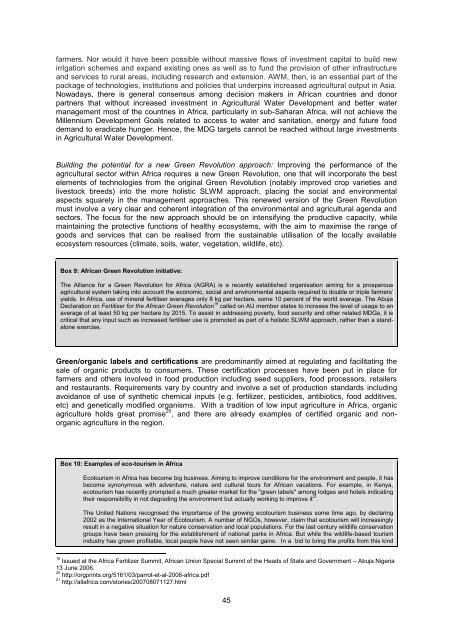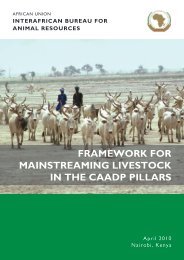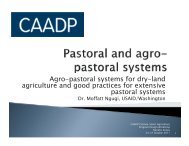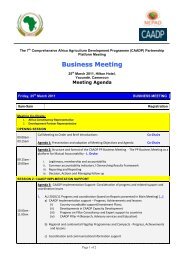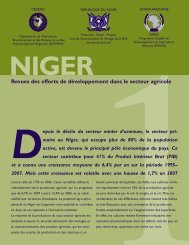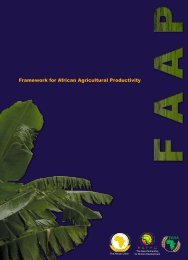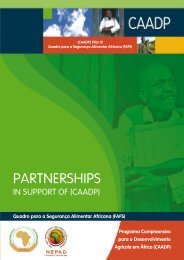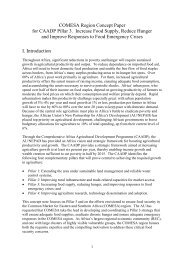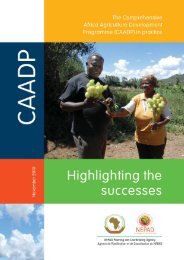ased GHG emission reductions in developing countries and countries with economies in transition 18 .Other opportunities need to be explored such as encouraging water companies, industry andirrigation schemes to provide financial incentives for land users in upstream catchment areas toadopt environmentally sensitive land management practices for the maintenance of water quality andquantity.Sustainable land and water management measures are also essential to address problems of landdegradation and associated poverty and food insecurity, as prioritised by countries that ratified theUNCCD, as well as to protect and preserve biodiversity, as prioritised under the UN Convention onBiological Diversity. Hence, there is potential to pursue several critical objectives synergisticallythrough promotion of SLM and water strategies in Africa, especially in the Sub-Saharan region,helping to mitigate and adapt to climate change while reducing land degradation, conservingbiodiversity and combating poverty and food insecurity.4.2 Demographic pressureAccording to UN projections, in 2004 Africa was home to some 906 million inhabitants. By 2015, thatpopulation is expected to swell to some 1.1 billion people. <strong>The</strong> economic, environmental, social,political and moral consequences of such population increases will be felt in all sectors of economicand social development.<strong>The</strong> emphasis put on increasing agricultural production mostly through the use of marginal landcoupled with the lack of a timely implementation of a family planning program and a nationalpopulation policy has led to a worsening of the interactions between population growth, land use andthe environment.Already some 39 percent of land on the African continent is degraded. Two-thirds of arable land isexpected to be lost by 2025 if population growth continues at its current pace and unless vigorousaction is undertaken to slow down this process. As a reminder, it is human activities that causeimpoverishment of the soil, in particular through: (i) deforestation and land clearing; (ii) badagricultural practices that cause erosion; (iii) overgrazing; and (iv) the over-exploitation of trees andshrubs for domestic uses, animals straying and bush fire. Political instabilities, conflicts andmigrations reinforce the harmful effect of men on natural resources.4.3 Green revolutionLearning from limitations of the original Green Revolution approach: <strong>The</strong> original Green Revolutionapproach with a reliance on the use of hybrid seed, mineral fertilisers and mechanisation largelyfailed to tackle the problems of low crop productivity in Africa. This was due to the approach‘s highand costly inputs, top-down approaches, requirements for good governance and lack of interest ofthe agricultural sector.While there were unprecedented yield increases when first introduced, advocates of the originalGreen Revolution did not recognise the importance of maintaining soil health (essential for the growthof healthy crops) or the need for a broader ecologically-based SLWM approach that is able to preventor correct, adverse changes in biological, chemical, physical and hydrological soil properties. In otherwords, while the old Green Revolution may have rapidly improved production, it depleted theresource base that was required to support it long-term. It is time to include best practices andlessons learned from these experiences in order to transcend to a more sustainable andtransformative approach.<strong>The</strong> Green Revolution in Asia could not have happened without massive flows of water irrigationwater to bring the best out of the new crop varieties and other inputs that were also made available to18 <strong>The</strong>re are Emission Reduction Purchase Agreements ongoing in Uganda and South Africa and other initiatives underdevelopment in DR Congo, Ethiopia, Kenya, Madagascar, Mali, Niger, Uganda and South Africa. Most of these are beingdeveloped to address land degradation issues, for instance in Democratic Republic of Congo, Ethiopia, Kenya, Mali, Niger andUganda payments are being made for afforestation, while in Madagascar a community-managed forest protection programmeis under appraisal.44
farmers. Nor would it have been possible without massive flows of investment capital to build newirrigation schemes and expand existing ones as well as to fund the provision of other infrastructureand services to rural areas, including research and extension. AWM, then, is an essential part of thepackage of technologies, institutions and policies that underpins increased agricultural output in Asia.Nowadays, there is general consensus among decision makers in African countries and donorpartners that without increased investment in Agricultural Water Development and better watermanagement most of the countries in Africa, particularly in sub-Saharan Africa, will not achieve theMillennium Development Goals related to access to water and sanitation, energy and future fooddemand to eradicate hunger. Hence, the MDG targets cannot be reached without large investmentsin Agricultural Water Development.Building the potential for a new Green Revolution approach: Improving the performance of theagricultural sector within Africa requires a new Green Revolution, one that will incorporate the bestelements of technologies from the original Green Revolution (notably improved crop varieties andlivestock breeds) into the more holistic SLWM approach, placing the social and environmentalaspects squarely in the management approaches. This renewed version of the Green Revolutionmust involve a very clear and coherent integration of the environmental and agricultural agenda andsectors. <strong>The</strong> focus for the new approach should be on intensifying the productive capacity, whilemaintaining the protective functions of healthy ecosystems, with the aim to maximise the range ofgoods and services that can be realised from the sustainable utilisation of the locally availableecosystem resources (climate, soils, water, vegetation, wildlife, etc).Box 9: African Green Revolution initiative:<strong>The</strong> Alliance for a Green Revolution for Africa (AGRA) is a recently established organisation aiming for a prosperousagricultural system taking into account the economic, social and environmental aspects required to double or triple farmers‘yields. In Africa, use of mineral fertiliser averages only 8 kg per hectare, some 10 percent of the world average. <strong>The</strong> AbujaDeclaration on Fertiliser for the African Green Revolution 19 called on AU member states to increase the level of usage to anaverage of at least 50 kg per hectare by 2015. To assist in addressing poverty, food security and other related MDGs, it iscritical that any input such as increased fertiliser use is promoted as part of a holistic SLWM approach, rather than a standaloneexercise.Green/organic labels and certifications are predominantly aimed at regulating and facilitating thesale of organic products to consumers. <strong>The</strong>se certification processes have been put in place forfarmers and others involved in food production including seed suppliers, food processors, retailersand restaurants. Requirements vary by country and involve a set of production standards includingavoidance of use of synthetic chemical inputs (e.g. fertilizer, pesticides, antibiotics, food additives,etc) and genetically modified organisms. With a tradition of low input agriculture in Africa, organicagriculture holds great promise 20 , and there are already examples of certified organic and nonorganicagriculture in the region.Box 10: Examples of eco-tourism in AfricaEcotourism in Africa has become big business. Aiming to improve conditions for the environment and people, it hasbecome synonymous with adventure, nature and cultural tours for African vacations. For example, in Kenya,ecotourism has recently prompted a much greater market for the "green labels" among lodges and hotels indicatingtheir responsibility in not degrading the environment but actually working to improve it 21 .<strong>The</strong> United Nations recognised the importance of the growing ecotourism business some time ago, by declaring2002 as the International Year of Ecotourism. A number of NGOs, however, claim that ecotourism will increasinglyresult in a negative situation for nature conservation and local populations. For the last century wildlife conservationgroups have been pressing for the establishment of national parks in Africa. But while the wildlife-based tourismindustry has grown profitable, local people have not seen similar gains. In a bid to bring the profits from this kind19 Issued at the Africa Fertilizer Summit, African Union Special Summit of the Heads of State and Government – Abuja Nigeria13 June 2006.20 http://orgprints.org/5161/03/parrot-et-al-2006-africa.pdf21 http://allafrica.com/stories/200708071127.html45
- Page 3 and 4: Lead TeamBWALYA Martin, NEPAD Secre
- Page 5 and 6: 3.2.4 Water and irrigation manageme
- Page 8 and 9: Executive SummaryThe Framework for
- Page 10 and 11: Focus on implementationThe heart of
- Page 12 and 13: performance of the agricultural sec
- Page 14 and 15: financial resources; and (v) provid
- Page 16 and 17: and regional development. By contra
- Page 18 and 19: Box 2: Summary of Land Degradation
- Page 20 and 21: Source: Douglas, 1994Apart from ine
- Page 22 and 23: Map 4: Extent of irrigation develop
- Page 24 and 25: Surface water is overwhelmingly the
- Page 26 and 27: 2.4 Crop production, livestock, fis
- Page 28 and 29: Policy, institutional and governanc
- Page 30 and 31: private sector and civil society ag
- Page 32 and 33: substantially. Overall, on a region
- Page 34 and 35: disciplinary experts required to so
- Page 36 and 37: 3.1.4 Landscape and ecosystem manag
- Page 38 and 39: quality that can enhance drought to
- Page 40 and 41: Box 5: Successful public large-scal
- Page 42 and 43: With considerable experience to dra
- Page 44 and 45: productivity has proved comparable
- Page 46 and 47: Issues related to the formulation a
- Page 48 and 49: Promotion market oriented AWM on a
- Page 50 and 51: TANZANIA: In Tanzania, water harves
- Page 52 and 53: improvement (e.g. planting, natural
- Page 56 and 57: of tourism closer to home, the Keny
- Page 58 and 59: commercial bank in London (Reuters,
- Page 60 and 61: Building African-owned coalitions a
- Page 62 and 63: provide the incentive for those uti
- Page 64 and 65: High level indicators of performanc
- Page 66 and 67: productivity and the capacity to pr
- Page 68 and 69: Soil Nutrient LossLoss of High Valu
- Page 70 and 71: Table 5: Some Social Consequences o
- Page 72 and 73: 2005). Likewise, at the large-scale
- Page 74 and 75: Annex 3: Investment Performance and
- Page 76 and 77: Weaknesses in institutional capacit
- Page 78 and 79: Ecosystem assessment - so as to ide
- Page 80 and 81: Table 5: Mainstreaming and Up-Scali
- Page 82: identifying key gaps and improving
- Page 85 and 86: FAO. 2003b. Bruinsma, J. (ed.). 200


